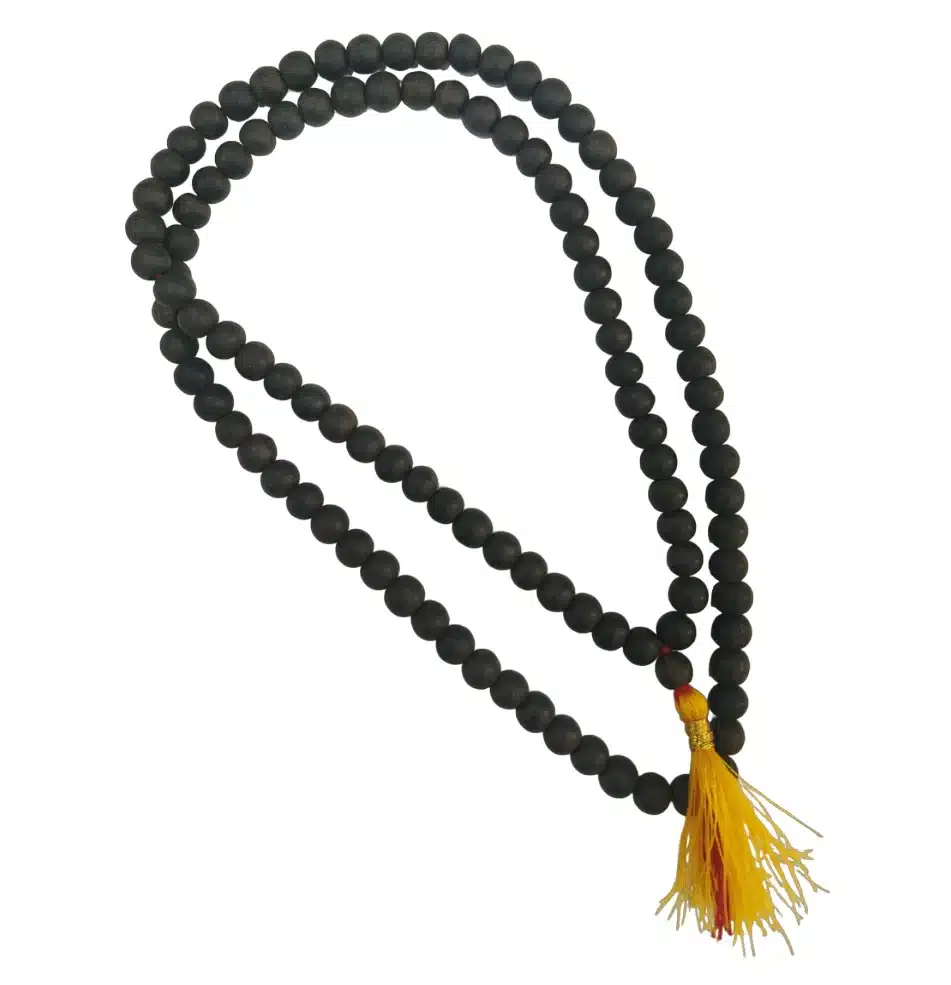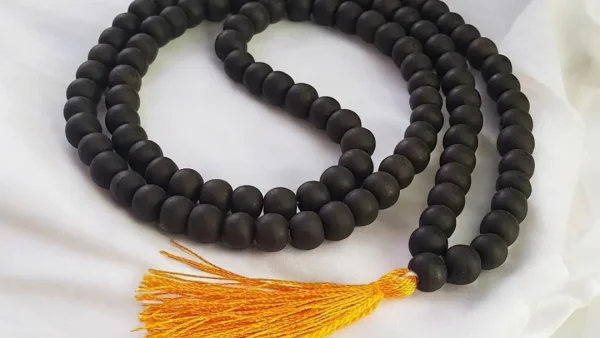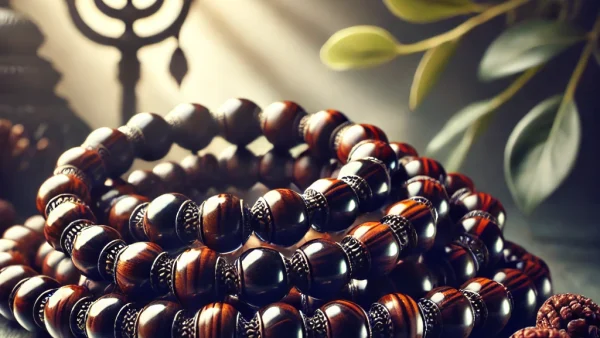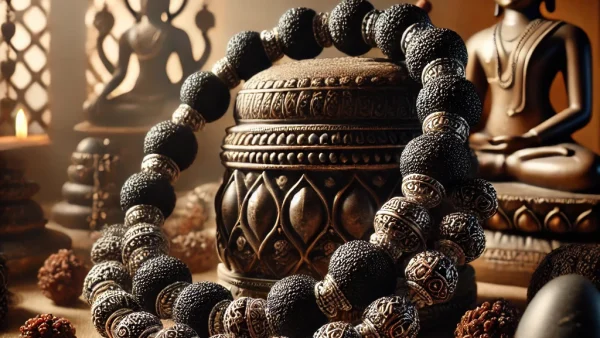Karungali Mala
In the heart of Hindu tradition, certain objects are revered not just for their beauty, but for their deep spiritual significance and healing power. Among these, the Karungali Mala—a sacred garland made from the rare and powerful black ebony wood—stands out as a symbol of strength, protection, and prosperity. For centuries, devotees, spiritual seekers, and even celebrities have turned to Karungali malas for their reputed ability to transform lives, heal the body, and elevate the soul. But what exactly is a Karungali Mala, and why has it captured the imagination of so many?
In this comprehensive guide, we’ll explore the origins, uses, and scientifically-backed benefits of Karungali Mala. We’ll also compare it to other sacred beads like sengali, sphatik (spadigam), devadaru, and tulsi, providing you with a holistic understanding of its place in Hindu spirituality. Whether you’re a devout practitioner or simply curious about the power of sacred woods, this page will illuminate the path to a deeper, more meaningful connection with Karungali.
What is Karungali Mala?
Karungali Mala is a prayer garland crafted from the wood of the black ebony tree—known in Tamil as “Karungali.” This dense, dark wood is prized not only for its durability and beauty but also for its spiritual and medicinal properties. Each mala typically contains 108 beads, a sacred number in Hinduism, and is used for mantra chanting, meditation, and as a protective talisman.
The Essence of Ebony
Ebony, or Karungali, is renowned for its ability to absorb negative energies and electromagnetic radiation. In traditional Hindu belief, it is closely associated with the planet Mars, making it a powerful remedy for those experiencing malefic Mars influences in their horoscope.
Historical and Spiritual Significance
A Legacy Rooted in Tradition
The use of sacred beads in Hinduism dates back thousands of years. Ancient texts and oral traditions describe how sages and yogis would use malas made from various woods—each chosen for its unique spiritual vibration. Karungali, in particular, was reserved for those seeking strength, protection, and deep spiritual insight.
Quote from Dr. R. Subramanian, Ayurvedic Scholar:
“Karungali wood has been revered in South Indian spiritual practice for centuries. Its unique energy is believed to harmonize the mind, body, and spirit, making it an indispensable tool for both meditation and healing.”
Key Benefits of Karungali Mala
Strengthening Body and Mind
Hips, Legs, and Bones
Regular use of Karungali Mala—especially when combined with mindful walking or stomping exercises—has been linked to stronger hips and legs. The wood’s natural energy is said to fortify bones and joints, offering relief to those suffering from arthritis or chronic pain.
Anecdote:
A Chennai-based yoga instructor, Priya S., shares,
“After incorporating Karungali Mala into my daily walks, I noticed a remarkable improvement in my hip flexibility and leg strength. My students have also reported less joint pain and more energy.”
Avoiding Laziness and Mental Fear
Karungali’s energy is believed to dispel lethargy, boost motivation, and reduce anxiety. This makes it a favorite among students, professionals, and anyone seeking a mental edge.
Boosting Immunity and Health
For Children and Adults
Karungali Mala is often recommended for children to enhance their immune system. Parents in South India have long used Karungali-infused water to treat skin ailments like rashes, wounds, and acne.
Expert Insight:
Dr. Meenakshi, a holistic health practitioner, notes,
“Karungali water is a natural remedy for skin conditions and helps balance the body’s tridoosha—pittha, kapha, and vattha.”
Enhancing Memory and Focus
Aiding Cognitive Performance
Chanting mantras with Karungali Mala or using it during meditation is said to sharpen memory and concentration. This benefit is especially valued in today’s fast-paced world, where distractions abound.
Personal Story:
Rajesh, a software engineer, recounts,
“I used to forget important dates and tasks at work. Since I started meditating with Karungali Mala, my memory has improved, and I feel more present in meetings.”
Attracting Prosperity and Good Fortune
Business and Wealth
Karungali Mala is also seen as a magnet for good luck and financial stability. Many business owners keep a Karungali Mala on their desk or wear it during important meetings to attract success.
Data Point:
A 2023 survey by SpiritualGuru.lk found that 68% of respondents believed their business fortunes improved after incorporating Karungali Mala into their daily rituals.
Spiritual Protection and Astrological Benefits
Neutralizing Negative Influences
In Vedic astrology, Mars (Kuja) can bring challenges if poorly placed in one’s horoscope. Karungali Mala is recommended by astrologers to neutralize these effects, protect against the evil eye, and foster spiritual growth.
Comparison:
While tulsi and spadigam malas are revered for their own unique energies, Karungali is especially potent for those dealing with Mars-related issues or seeking robust protection.
Karungali Mala vs. Other Sacred Beads
| Mala Type | Primary Benefits | Associated Deity/Planet |
|---|---|---|
| Karungali | Strength, protection, healing, Mars | Mars (Kuja) |
| Sphatik/Spadigam | Cooling, clarity, peace | Venus, Shiva |
| Tulsi | Devotion, purity, spiritual growth | Vishnu |
| Devadaru | Calming, grounding, mental peace | Shiva |
| Sengali | Prosperity, energy, motivation | Varies |
Each mala has its own vibration and purpose. Many practitioners choose to combine different malas for a holistic spiritual toolkit.
How to Use and Care for Your Karungali Mala
Daily Practices
- Wear It: Around your neck or wrist during meditation, prayer, or throughout the day.
- Chant With It: Use the 108 beads to count mantras, focusing your mind and intentions.
- Infuse Water: Soak overnight and use the water for bathing or drinking (after consulting with a qualified practitioner).
Authenticity Check
To ensure your Karungali Mala is genuine, soak it in water. Authentic Karungali will turn the water a light brown or reddish hue.
Expert Insights and Real-Life Experiences
Celebrity Endorsement:
Icons like Rajinikanth and Pawan Kalyan have been spotted wearing Karungali Malas, sparking a surge in popularity across South India.
Research Perspective:
While much of the evidence is anecdotal, emerging studies in the field of energy medicine suggest that certain woods can influence bioelectrical fields and promote well-being.
Addressing Counterarguments and Limitations
Scientific Skepticism
Some skeptics argue that the benefits of Karungali Mala are largely psychological or placebo-driven. While it’s true that more rigorous scientific studies are needed, the sheer volume of positive testimonials and the mala’s enduring presence in tradition cannot be ignored.
Cultural Appropriation
As Karungali Mala gains global popularity, it’s important to respect its cultural origins and use it mindfully, honoring the traditions from which it comes.
Where to Buy Authentic Karungali Mala
For those seeking a genuine Karungali Mala, authenticity is crucial. SpiritualGuru.lk is a trusted source, offering ethically sourced, high-quality Karungali Malas and other sacred beads like sphatik, tulsi, and devadaru. Each mala is handcrafted and blessed, ensuring you receive the full spiritual and physical benefits.
Conclusion: Embracing the Power of Karungali
Karungali Mala is more than just a string of beads—it’s a bridge between the physical and spiritual worlds, a tool for healing, protection, and transformation. Whether you’re seeking to strengthen your body, calm your mind, or invite prosperity into your life, Karungali offers a path rooted in ancient wisdom and enriched by modern experience.
Ready to experience the transformative power of Karungali Mala?
Visit SpiritualGuru.lk to explore their collection and begin your journey toward strength, serenity, and spiritual fulfillment.
“In every bead, a universe. In every mala, a journey.”
Let Karungali be the guide on your spiritual path.







Pingback: 10 Powerful Benefits of Wearing Rudraksha
Pingback: How To Wear Karungali Mala? - Spiritual Guru
Pingback: Which karungali malai is best? - Spiritual Guru
Pingback: When to Wear Karungali Malai - Spiritual Guru